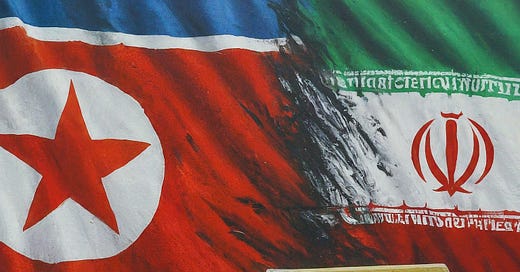Goodbye UN PoE; Russia evading oil cap; Tehran and Havana grow closer, Iranian sanctions
Prohibited Transactions for the week of 29 Apr 2024 (#46)
//Hi everyone, thanks for reading! This week’s issue is a bit truncated as I have spent the last few days at the West Coast AML Forum, listening to talks about AI and compliance, pig-butchering, public-private partnerships, healthcare fraud, sanctions and proliferation finance, and many others. Very interesting to get a better grasp on what AML professionals in the US are currently focused on.
I also note this issue marks the one-year anniversary of Prohibited Transactions. I started this newsletter as a way to keep up with what’s going on with the bad actors of Pyongyang and Tehran; over the course of the year, it seems that their illicit networks grow stronger and more resilient, as they strengthen old relationships — such as the DPRK with Russia — and embed deeper into their parts of the world — as Iran is doing with its regional trade and transport ambitions. I hope what is covered in Prohibited Transactions — which I know may not always seem to have a direct connection with their sanctions evasion or proliferation activities — helps you to be better prepared as we wage financial warfare across the economic and geopolitical terrain that we find ourselves in.
North Korea
The mandate of the UN Panel of Experts (PoE) on North Korea’s illicit activities expired on 30 April 2024, with no last-minute deal by members of the UN Security Council (UNSC) to save the PoE and its work (see Issue #43). A former member of the PoE noted that the DPRK would more easily be able to set up new operations or re-establish networks in unsuspecting countries which don’t have the resources to monitor North Korea’s illicit activities.
There have been discussions about establishing an alternative monitoring method to keep tabs on the DPRK’s sanctions evasion activities, though the form it would take or where it would be based out of are yet to be decided.
Eric Penton-Voak, a former coordinator of the PoE, laid out some of the weaknesses of the PoE system within the UN, as well as suggestions for the characteristics a new monitoring body should have. The weaknesses include:
“The 1718 Committee has become utterly toothless” as it has not implemented any sanctions recommendations by the PoE since 2017.
The PoE was bound by the rules of consensus, so objections by Russian or Chinese experts could result in removal of information from the final published report.
The PoE was under-resourced with obsolete information technology (IT) resources.
Any future iteration of the PoE should include:
Experts who are skilled in open source and sensitive investigations, backed up by data, IT, and analytical tools.
The ability to handle sensitive intelligence material, and be able to independently corroborate it.
Legal support to deal with potential lawsuits and other challenges to its work, as it would no longer be under the auspices of the UN, which has immunity from national courts.
A more flexible schedule of publishing reports.
//As I mentioned in a previous issue, I was recently part of a panel discussion on the topic of “Revisiting sanctions on North Korea.” The video of our discussion is now online, and you can hear me and three other experts (including Eric Penton-Voak) speak on different aspects of the sanctions regime directed against North Korea.
North Korea likely paid close attention to the Iranian missile barrage directed at Israel in mid-April, hoping to gain deeper insights into how their munitions would perform in similar situations. Both the US and EU are keeping a close eye on potential military cooperation between Pyongyang and Tehran. //A reader was good enough to send me this article from last month, which details how many of the Iranian medium-range ballistic missiles used against Israel are based off of North Korean missile technology and designs.
--
The US is accusing Russia of sending refined petroleum to the DPRK at levels that would violate the UN imposed cap of 500,000 barrels a year. In response, the US government is coordinating with allies to announce new sanctions designations.
North Korea’s economic situation has improved in recent months, due to the import of goods from Russia. Kim Jong-un is likely trying to return to a Cold War model, where Pyongyang can exploit having two patrons in Russia and the PRC, as opposed to solely relying on Beijing.
Iran
Iranian and Cuban officials agreed to establish a twinning relationship between two major ports in each country, as well as possibly setting up some sort of agreement which would see the two countries provide shipbuilding services for nations in South America.
An Iranian maritime official reported that three 90,000-ton vessels ordered from Iran have now been delivered to Venezuela.
Three Iranian shipbuilders — SADRA, Iran Shipbuilding and Offshore Industries Complex, and Darya-Bandar — have formed a consortium to build all-Iranian ships. SADRA has been under US sanctions since 2012. //Will this consortium get sanctioned at some point?
Tehran and Havana also signed an agreement to launch a joint committee of commerce to improve bilateral trade between the two nations.
Iran’s Ministry of Foreign Affairs sanctioned a number of US and UK individuals and companies for their support of Israel.
Iran and Saudi Arabia are discussing increasing trade and economic cooperation, as well as developing monetary and banking relationships.
An Iranian official stated that Georgia could become a re-export hub of Iranian products, and not just as a final destination. //Though it was a decade ago, the US did sanction a relatively large Iranian illicit network based out of Georgia in 2014.



